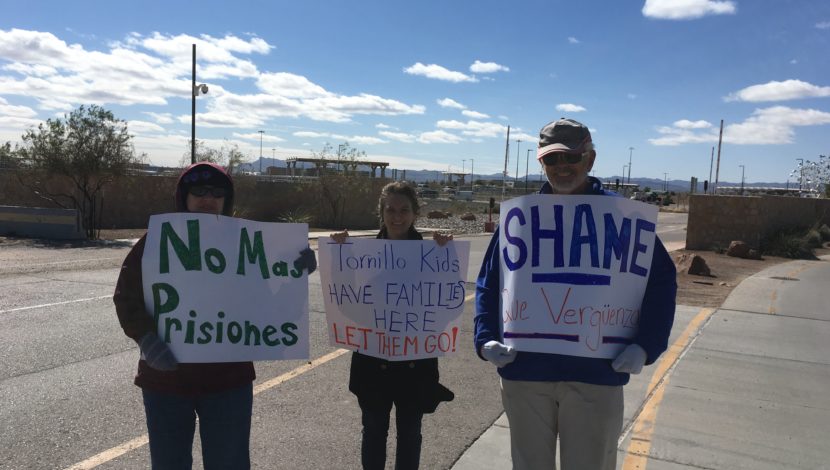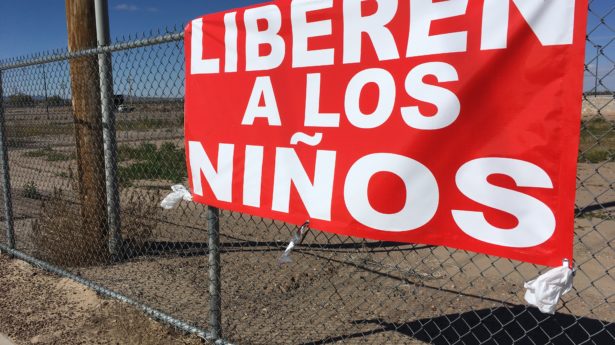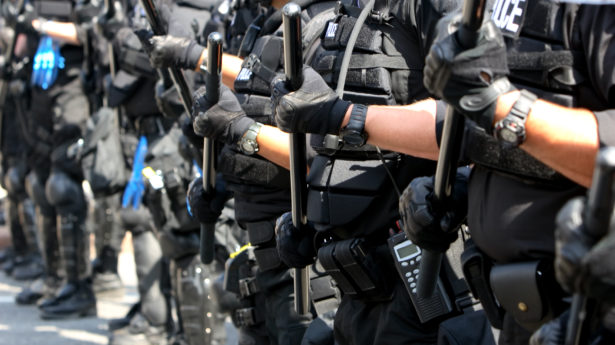The Unitarian Universalist Service Committee advances human rights through grassroots collaborations.

By on December 3, 2018
UUSC Senior Grassroots Organizer Hannah Hafter has authored a four-part series on her experiences on the southwest border. This is part two of the series. Part one is here.
Part 2: Emergency Shelter: The San Juan Diego Center
What brought me to El Paso was an emergency call for volunteers from the Annunciation House. In 40 years of providing hospitality to arriving asylum-seekers, they had never experienced anything like what they faced shortly before the 2018 elections. The Department of Homeland Security changed their policy and from one day to the next, hundreds of families were being dumped on the streets downtown with no plan for their safety or how they would get to their destination.
Annunciation House jumped in immediately, setting up emergency shelters and arranging with Immigration and Customs Enforcement for families to be dropped off with them instead of downtown. Suddenly a small group of volunteers went from welcoming around 20 families a week to more than 1,000. I went down to assess the situation as well as provide direct support, and we were able to set up a program together with the UU College of Social Justice that is providing regular volunteers until the end of December, and longer if needed.
The Trump administration’s apparent contradiction of releasing thousands of Central American asylum-seekers at the exact same time as publicly disparaging the “migrant caravan” started to make sense as a political ploy. I had heard from pro bono lawyers in the three major family detention centers that the facilities were now nearly empty. Why? First of all, creating the image of border cities overrun with migrant families with nowhere to go fed the story of an unmanageable crisis. Second, the Trump administration has been so adamant about locking up “the caravan” that they literally reserved the detention space by releasing asylum-seeking families in the exact same position, but who aren’t identified as “the caravan.” Yet they would not allow it to be too easy—so they abandoned all post-release planning and started dropping people off with nothing but an ankle monitor and paperwork in English with an appointment for an ICE check-in at their destination.
The San Juan Diego Center was one of 13 makeshift emergency shelter locations, and hadn’t even been open for two weeks yet when I arrived. Each former classroom of the defunct parochial school building was filled with green folding cots: one room for women with children; another for men with children; a third for mixed families. Each day a bus came in the afternoon to drop off 50-100 people—always at least half children—and after they received a hot meal the main focus would shift to helping them connect with family or friends in the United States who would host them. If people had been separated from other family members or had urgent medical needs, that took priority. Otherwise, the goal was for their family to purchase them bus or plane tickets and for us to get them rides to the bus station or the airport with a care package containing enough food to last the trip. For 50 to 100 people a day, every day.
One cold and rainy afternoon I noticed a young father with a curly-haired toddler in his arms in the crowd exiting the bus. They stood out because the small girl was shirtless. My knee-jerk reaction was judgement: what on earth is this father thinking, letting his daughter go half-naked in this weather? I just as quickly realized that it was out of his control, and that I had reacted thoughtlessly. As a volunteer ran to get something for her to wear, he told us the story about how she had been sick and vomited on herself in Border Patrol detention. An agent took her top and threw it away without offering anything in its place. The only thing they had for warmth was a thin silver Mylar blanket, inside a cell kept so cold it is known as la hielera—the icebox.
Despite the news, we saw that family separation is still fairly common. The injunction only stopped Border Patrol from separating biological parents from their children, so the cases we saw at the shelter were entirely acceptable within the policy: a grandmother who had the grandchild she raised removed from her; an aunt released with her own children frantically seeking information about her niece. A woman whose husband had recently died (I did not ask the circumstances) was traveling with her two sons. She was released with her 16-year-old, but knew nothing about the whereabouts of her 18-year-old, legally an adult male and therefore held apart from them. The best we could do was give her information to contact the Honduran consulate for help and a referral to an immigrant rights organization on Long Island, N.Y., which she left for that afternoon. While they are all fleeing the same circumstances, he will have to pursue his asylum claim independently—if he is even allowed to try.
I realized that when it was time for a parent and their kids to leave for the bus station or the airport, it was important to give them enough notice that they could say goodbye to others with whom they had shared this journey. Strong bonds were formed under duress, and people who didn’t know each other a month ago felt like family.
There was a teenage girl who jumped up to help every time we needed a volunteer for cleaning. I recognized the furry, baggy rainbow pants she wore from a pile of donations the day before. I had lifted them up and complained that people used no discretion over what to give to a shelter and just took it as an opportunity to clean their closets – but she proved me wrong and was totally rocking them, tucked into her big brown lace-up boots. She told me that her father lived in New Mexico and was driving to pick her and her mother up from the shelter. After a teary reunion when he arrived, she turned back to me and said, “We’re going to live less than an hour from here. My mom and I are going to come back and volunteer. I promise you.”
Read part 3...
Photo Credit: Hannah Hafter

